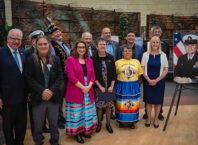DOJ DECIDES TRIBES CAN LEGALIZE
MARIJUANA
WASHINGTON – In a memo released on
Dec. 11, the U.S. Justice Department outlined new policies allowing
tribes to grow and sell marijuana on reservation lands.
The new federal policy will allow
tribes interested in growing and selling marijuana to do so, if they
maintain "robust and effective regulatory systems," John
Walsh, the U.S. attorney for Colorado, told media. Tribes will need
to avoid eight enforcement triggers that currently apply to state
marijuana sales, including a prohibition on sales to minors and the
diversion of marijuana to states where it remains illegal under local
law.
Of the 326 federally-recognized
reservations, many are in states that currently do not allow
marijuana for medical or recreational use, such as Oklahoma, Utah and
the Dakotas.
“The tribes have the sovereign right
to set the code on their reservations,” U.S. attorney for North
Dakota Timothy Purdon, chairman of the Attorney General’s
Subcommittee on Native American Issues said.
In a statement, the Department of
Justice said U.S. attorneys will review tribal marijuana policies on
a case-by-case basis and that prosecutors retain the right to enforce
federal law.
“Each U.S. attorney will assess the
threats and circumstances in his or her district, and consult closely
with tribal partners and the Justice Department when significant
issues or enforcement decisions arise in this area,” the statement
reads.
While possession of marijuana is still
a federal crime, the department announced in August 2013 it would
allow states to regulate recreational marijuana sales. The nation’s
first recreational pot stores opened in Colorado and Washington in
2014. Residents of Alaska, Oregon and the District of Columbia voted
in November to also legalize marijuana, though Congress appears
likely to block sales in the nation’s capital.
FEDERAL OFFICIALS WARN TRIBES ABOUT
FUNDING MISUSE
WASHINGTON – The Office of Inspector
General at the Department of Health and Human Services issued a
warning to tribes about the misuse of federal health care funds.
In a Nov. 24 alert, the OIG said it
has conducted investigations that uncovered misspending. None of the
affected tribes or tribal organizations were identified but agents
are worried that the money isn’t being used to provide health care in
Indian Country.
"In the most egregious cases,
funds were converted to personal use, leaving the tribes with
dangerous shortages in health care funding for its members," the
alert stated.
Gerald Roy, a special agent at OIG,
pointed out that tribal officials and employees in Montana and South
Dakota have been indicted and convicted for musing federal funds.
“Most of those people who have given us the most pushback are
either in jail or headed to jail," Roy said.
The alert was directed at tribes that
enter into contracts with the Indian Health Service under the Indian
Self-Determination and Education Assistance Act. Tribes that receive
Medicare, Medicaid and Children’s Health Insurance Program funds
must ensure they are being used properly, it stated.
"Recent OIG investigations have
uncovered instances in which tribes used ISDEAA funds to support
unauthorized activities. In some cases, shared costs were not
allocated correctly between IHS and other activities," the alert
said. "In others, ISDEAA funds were ‘borrowed’ to meet other
tribal expenses."
BIA FINALIZES RUL TO ADD ALASKA TRIBES
TO LAND-INTO-TRUST PROCESS
WASHINGTON – The Bureau of Indian
Affairs has finalized a regulation that allows Alaska tribes, for the
first time, to follow the land-into-trust process.
For decades, the BIA argued that the
Alaska Native Claims Settlement Act of 1971 prevented Alaska tribes
from acquiring trust lands. But a federal judge threw out that
argument, paving the way for the new rule.
“This marks a major step forward in
federal policy in Alaska. Our aim is to make it possible to secure
tribal homelands, which in turn advances tribal sovereignty and
economic development, promotes the health and welfare of tribal
communities, and protects tribal culture and traditional ways of
life,” Assistant Secretary Kevin Washburn, the head of the BIA,
said in a press release on Dec. 18. “Restoring tribal lands to
trust status furthers tribal self-governance."
The Native American Rights Fund
represented four tribes and one Native individual in the lawsuit that
challenged the Alaska exclusion. Attorney Heather Kendall-Miller
praised the rule, which will be sent to the Federal Register for
publication.
Kendall-Miller called the rule “an
extraordinary step forward in the longstanding battle of Alaska
Tribes to secure greater tribal self-determination, to protect their
lands and way of life in perpetuity, and to enjoy the same basic
privileges and immunities enjoyed by all other Native American
tribes.”
Despite the announcement of the rule,
the BIA cannot actually approve any Alaska land-into-trust
applications under orders of Judge Rudolph Contreras. He put a hold
on any decisions in order for the state of Alaska to take the case to
the D.C. Circuit Court of Appeals.
TRIBE BEGINS POTENTIALLY LUCRATIVE
SETTLEMENT TALKS
WASHINGTON – Millions of dollars
could be at stake as representatives from a South Dakota tribe join
talks to settle 24-year-old litigation.
The Oglala Sioux Tribe, including
residents of the Pine Ridge Indian Reservation, is a plaintiff with
other tribes in a lawsuit against the federal government that dates
to 1990. The tribes won a U.S. Supreme Court decision in 2012 and
have been working to receive payments ever since.
The dispute is over contract money
that the federal government pays tribes to operate federally
supported programs. The tribes successfully claimed the payments were
insufficient. There are some hints in legal documents, including the
federal government’s petition to the Supreme Court in 2011. "The
accumulated tribal requests for unfunded contract support costs are
estimated to exceed $1 billion,” the government’s lawyers wrote
at the time, “and the problem grows worse with each federal budget
cycle.”
The litigation’s roots extend to
1975, when Congress passed the Indian Self Determination and
Education Assistance Act that allowed tribes to take over some
programs previously run by the federal government. Instead of
operating the programs directly, the government would provide funding
to tribes through contracts.
Tribes claim the contract amounts were
insufficient to cover some of the peripheral costs associated with
running programs. For the Oglala Sioux Tribe, an example is its
police department. The federal contract to fund the department paid
for major expenses like officer salaries, but the tribe contended the
contract was insufficient to cover overhead costs like managing the
payroll, buying uniforms, maintaining patrol cars and operating a
telephone system.
The peripheral expenses outside of the
main contract costs are called “contract support costs.” In 1988,
Congress mandated that contract support costs be covered, but
according to some tribes, neither the Interior Department and its
Bureau of Indian Affairs, nor the Department of Health and Human
Services and its Indian Health Service, carried out the congressional
mandate.
In 1990, the Ramah Navajo Chapter in
New Mexico filed a lawsuit seeking full payment of contract support
costs. In 1999, the Oglala Sioux Tribe joined a then nine year-old
lawsuit filed by the Ramah Navajo Chapter seeking full payment by the
federal government. The tribes won a $80 million settlement that year
and another settlement of $29 million in 2002 on a portion of their
claims. Their attorneys collected a combined $14 million in fees.
But the litigation, already 12 years
old at that point, was not over. In 1994, Congress had capped the
total amount of money available for contracts with tribes. The cap on
contract payments opened a new legal front in the case that reached
the U.S. Supreme Court in 2012. The tribes won a 5-4 decision
upholding their claim that the government owed them full payment of
contract support costs.
The only thing left to decide now is
the amount owed to the tribes. Representatives of the parties
involved in the lawsuit met on Dec. 15 in Albuquerque, N.M. for a
settlement conference.
WASHINGTON TEAM MASCOT GARNERS
CONTINUED ATTENTION
NEW YORK – The CBS “Late Show”
host David Letterman, weighed in on the Washington NFL team mascot
issue.
In a skit on a Dec. 15 show,
Letterman, suggested that rather than a name change, a mascot change
to red skin potato. He said the nickname for the team could be
“spud.”
While the suggested logo change began
in 1987, Letterman’s spin on the issue marks one more celebrity who
has offered support to change the mascot, which also includes
representatives of the United Nations, members of Congress and
President Barack Obama.
In his show, Letterman said,
“Indigenous people of America believe that the term Redskins is
offensive. Now, I myself – not being an indigenous people, but know
enough about what the white man did to the indigenous people – I’m
with the American Indians. If they find this offensive, by God so do
I. Haven’t they suffered enough? I mean, it’s one indignity after
another, and for the love of God, if this is any small measure –
and it’s impossible to set the balance accurately – but if this
makes anyone feel better about who and what they are, by God, do it,
change the name. Change the name. There’s a million names.”
Additionally, team mascot opponents
staged a rally on Dec. 28 near FedEx Field, a significant protest
directly targeting the team’s stadium. More than 100 people gathered
in a grass lot across from Jericho City of Praise, a church less than
a mile away from the stadium.
Organizers had decided not to
march around the church, as originally planned, and to stage the
entire rally inside the empty lot. But then there was another change
of plans: the march was on. At one point, the march halted traffic
headed toward the stadium. The rally has been
mostly peaceful, but at least one Redskins fan expressed discontent,
shouting expletives at protesters.
As at a large protest in Minneapolis
on Nov. 2, mascot opponents wore burgundy and gold shirts with words
written on the front in team font: “RENAME, RETHINK, REPLACE.” A
few fans holding signs — “STOP THE RACISM”; “CHANGE THE NAME”
– also lined up along the sidewalk.
There was another event nearby going
on at the same time – a fundraiser that infuriated the organizer of
the name rally. The original name of the other event, which was
changed after The Washington Post reported it, was “Scalp
Out Cancer: Because Bald is Beautiful.”
“Scalp” was replaced with “Shave.”
COURT RULES IN FAVOR OF OMAHA TRIBE’S
CASE
ST. LOUIS, Mo. – The Omaha Tribe of
Nebraska’s reservation has not been diminished, the 8th Circuit Court
of Appeals ruled on Dec. 19.
In a unanimous opinion, the court said
Congress did not change the boundaries of the reservation when it
opened part of the tribe’s land base to non-Indian settlers in 1882.
The ruling was only five pages but it upheld the findings of a
federal judge who "thoroughly, thoughtfully, and accurately"
examined the law and other evidence at issue in the dispute.
"The court carefully reviewed the
relevant legislative history, contemporary historical context,
subsequent congressional and administrative references to the
reservation, and demographic trends, and did so in such a fashion
that any additional analysis would only be unnecessary surplus,"
Judge Clarence Arlen Beam wrote, referring to the lower court’s
decision.
Ever mindful to ‘resolve any
ambiguities in favor of the Indians,’ there is nothing in this case
to overcome the ‘presumption in favor of the continued existence’ of
the Omaha Indian Reservation," Beam continued.
The decision means the village of
Pender remains part of the reservation as the tribe has always
contended. More significantly, it means a group of non-Indian
businesses must comply with the tribe’s liquor laws and regulations,
including a 10 percent tax on sales.
The non-Indian plaintiffs, however,
could ask the U.S. Supreme Court to review the matter. A reservation
diminishment case hasn’t been heard by the justices since South
Dakota v. Yankton Sioux Tribe, a 1998 decision cited by the 8th
Circuit.






